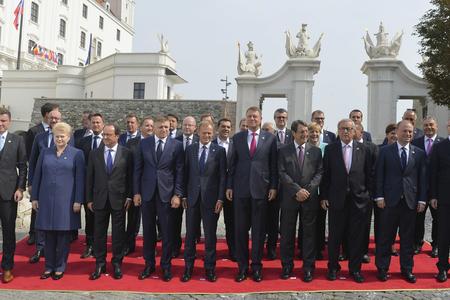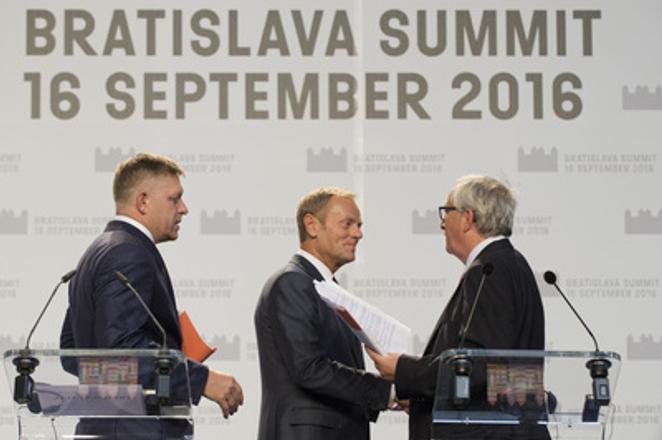“I viewed the initiative of the Slovak Presidency [of the Council of the EU] and the prime minister [Robert Fico] to organise the informal EU summit in Bratislava on Friday, September 16 as a good idea, but I had growing concerns regarding overblown expectations,” President Andrej Kiska told the TASR newswire the next day. “Looking back, I believe that the course of the Bratislava summit and its results fulfilled both its goals and purpose. Top politicians are also human beings, and there is nothing like a personal touch. Differences of opinion are natural, and misunderstandings happen. The best way to resolve these is to have people talk them through,” Kiska said.
Although the EU today faces problems, the president is convinced that the EU’s options and capabilities highly outweigh the current mood of doom and gloom.
“If it turns out that the Bratislava summit represents the beginning of a process of reining in negative emotions; if it’s the beginning of more empathy from European institutions towards individual countries and from individual countries towards each other, the Bratislava summit might be seen as beneficial by posterity,” he summed up.
The president believes that despite the criticism levelled at Slovakia over the summit’s shortcomings, the organisation of the event was a success for the country. “I think that every country wants to show off on such occasions – that’s only natural,” Kiska opined. “I believe that Slovakia and Bratislava succeeded in this regard. If the only problem was bad coffee for journalists and a short disruption in the wi-fi service, then we as the organisers pulled off an excellent job, and this is consistent with the overall picture of how Slovakia has fared in its presidency so far,” he claimed, extending his congratulations to all those involved in organising the summit.
However, he slammed Hungarian Prime Minister Viktor Orbán’s statement that the EU summit in Bratislava was unsuccessful as inappropriate and running counter to the purpose and goals of the event. “We all know that it’s not only mistakes, missteps and problems brought by life that are detrimental to the idea of the EU, it’s also when politicians forget to say a single nice word about the EU and its institutions, and Brussels has become nothing but a curse word,” Kiska said. “However, those politicians often pursue only their own narrow domestic interests. They don’t care about improving the EU, only about their domestic popularity, percentages, elections and cynical oversimplification of complex issues and exaggeration.”
As for the statements made by Italian Prime Minister Matteo Renzi regarding migration, President Kiska called for more empathy and understanding regarding the situation in which Italy finds itself at the moment.
PM Fico: Goal successfully met with the EU summit
Slovakia has experienced an enormous diplomatic success, Prime Minister Robert Fico said about the informal EU summit on public TV channel RTVS’ political discussion programme “O päť minút dvanásť” (Five Minutes to Twelve) on September 18. He dismissed criticism of the event as a display of negativism. In his view, it was vital for representatives of EU member states to meet in Bratislava and announce to a European audience that they plan to go on. That goal was successfully met with specific measures to follow at upcoming formal summits in Brussels, he claimed.
“Please, let's put some positive spin on this and be a little bit proud of this country,” he stressed on the show. “This country is stable; this country prospers. If it weren’t stable and prosperous, the summit would never have taken place in Bratislava. So let’s not bemoan everything as being bad and negative. It was a good summit, and I stand behind that statement.”

Slovakia initiated the informal meeting in order to have the EU members discuss issues on which they could arrive at an agreement and which would help bring the EU together. Therefore, the discussion did not revolve around mandatory migrant quotas or sanctions against Russia; but rather about the protection of external European borders, the fight against terrorism, economic and social issues, combating unemployment among young people and the digitisation of Europe.
The summit’s discussions did not involve cutting European funds for countries that have not shown solidarity in terms of resettling migrants, according to Fico. On the contrary, there is a plan to double the volume of the so-called Juncker Fund designed to support large-scale investments, one beneficiary of which should be Slovakia. For instance, the new Bratislava bypass is to be financed from the fund. “This is yet another specific result of the Bratislava summit,” Fico added, as quoted by TASR.
The Bratislava declaration, the Bratislava process or the Bratislava road map are expressions that should be added to the EU vocabulary, according to Slovak PM Robert Fico, though no fundamental agreements have been made at the September 16 informal meeting of EU 27 leaders. The so-called Bratislava summit has launched a process that should be completed at next year’s meetings in Malta and Italy, the Denník N daily wrote on September 19. Though the EU leaders were to discuss how the Union will operate after Brexit, the main topics concerned security, like the creation of a common army and the protection of borders.
“We need to answer the questions people ask us, because if we do not answer them, people who are very dangerous will do it instead,” said Fico after the summit.



 L-R: Slovak PM Robert Fico, European Council President Donald Tusk and European Commission head Jean-Claude Juncker, at a press conference September 16. (source: TASR)
L-R: Slovak PM Robert Fico, European Council President Donald Tusk and European Commission head Jean-Claude Juncker, at a press conference September 16. (source: TASR)